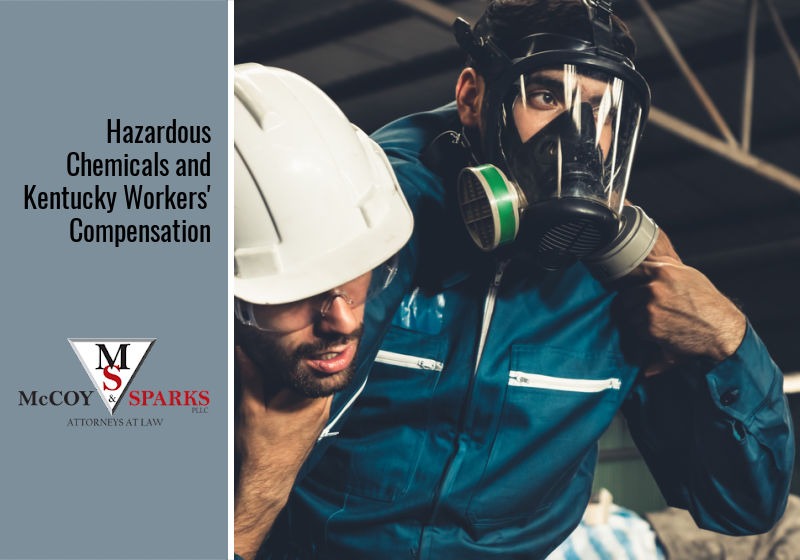
Tens of thousands of workers in the U.S. are exposed to hazardous chemicals in the workplace every day. These chemicals are classified as health hazards and can cause severe and even life-threatening health problems.
If you work in Kentucky and were exposed to a toxic and hazardous chemical in the workplace, get in touch with someone from our office immediately. Chemical exposure is not something to take lightly, and our Kentucky workers’ compensation lawyers can help.
What Happens When Employees Are Exposed to Hazardous Chemicals?
People come in contact with chemicals every day, but some workers are at high risk of exposure due to the nature of their job. Unfortunately, regular exposure to hazardous chemicals can cause serious health problems.
The CDC and the Agency for Toxic Substances and Disease Registry list the following bodily systems as those often affected by hazardous chemical exposure:
- The Respiratory System: When the respiratory system is exposed to chemicals, it can lead to lung cancer, chronic bronchitis, fibrosis, emphysema, and low blood oxygen levels.
- The Renal System: This system helps rid the body of waste. Exposure to chemicals can cause decreased urine formation, reduced blood flow to the kidneys, inability to filter blood, kidney tissue damage, and kidney cancer.
- The Cardiovascular System: Cardiovascular health effects from prolonged exposure to toxic chemicals can include heart failure and the inability to carry oxygen to the body through the blood.
- The Reproductive System: If the reproductive system is affected by chemical exposure, it can lead to infertility issues, increased birth defects, and infant deaths.
- The Nervous System: Long-term chemical exposure effects on the nervous system can include loss of mobility, loss of feeling and sensation, speech, sight, and memory problems, confusion, and loss of muscle strength and coordination.
- The Immune System: When the immune system is affected by chemical exposure, it can lead to chronic allergies, autoimmunity, and a general slowdown and failure of the immune system.
- The Hepatic System: This system is responsible for breaking down food and storing nutrients. When affected by chemical exposure, it can cause liver damage, tumors, and increased accumulation of fat.
The skin, of course, can also react when exposed to chemicals. Employees who frequently work with hazardous materials can experience skin irritation, rashes, redness and discoloration, dermatitis, and chemical burns.
Common Chemical Hazards in the Workplace
Almost all employees are exposed to some chemicals throughout their workday, no matter what industry they work in. Chemicals are everywhere. They’re in cleaners, paints, paint removers, dyes, gasoline, lubricants, pesticides, and more.
However, some employees are more exposed to chemicals than others, especially those that work in factories, plants, warehouses, and labs that specifically deal with dangerous chemicals. OSHA lists the following as some of the most common chemical hazards in the workplace:
- Arsenic
- Asbestos
- Asphalt fumes
- Diesel exhaust
- Formaldehyde
- Hydrogen sulfide
- Lead
- Mercury
- Toxic metals
- Metalworking fluids
- Silica
- Solvents
- Synthetic mineral fibers
- Benzene
- Beryllium
- Chromium
- Ethylene oxide
- Toluene
Reasons Why Workers Might Be Exposed to Hazardous Chemicals
There are many reasons why a worker might be exposed to hazardous chemicals in the workplace. For some workers, it is simply the nature of the job, such as road workers inhaling asphalt fumes. Still, an employer must ensure their employees are safe and protected to limit exposure.
Some of the most common reasons why workers might be exposed can include:
- Improper hazardous chemical disposal
- Lack of training on how to handle chemicals
- Lack of safety/protective equipment and gear
- Malfunctioning equipment
- Poor ventilation systems
- Lack of safety protocols
- Protocols not being enforced or followed
Is Chemical Exposure Covered By Kentucky Workers’ Compensation?
Workers’ compensation does not just cover workplace injuries; it also covers illness and health conditions that can arise as a result of chemical exposure. However, you must be an eligible employee to file for workers’ compensation to have your medical bills and lost wages covered as a result of the chemical exposure. The exposure must also result from chemicals you were exposed to in the workplace, not at home or anywhere else.
All Kentucky employers with one or more employees are required by law to provide workers’ compensation benefits. And those benefits are available to those who are considered an employee by the state. This includes:
- State, county, or city employees
- Volunteer firefighters
- Anyone working under contract for hire
- Those who sell and deliver newspapers
- Any person who performs services in a trade profession or business
If you fall under one of these categories and you are exposed to chemicals in the workplace that cause you injury or illness, you have a right to file a claim for workers’ compensation.
Trust McCoy & Sparks—Premier Workers’ Compensation Attorneys in Central Kentucky
At McCoy & Sparks, our workers’ compensation lawyers can help you file your claim, deal with denials or appeals, and make sure your benefits are fairly calculated so you are paid the full amount you are owed.
You owe us nothing unless we recover compensation for you. Make the right call to (844) 4KY-WINS for a risk-free consultation with one of our workers’ compensation attorneys today.

